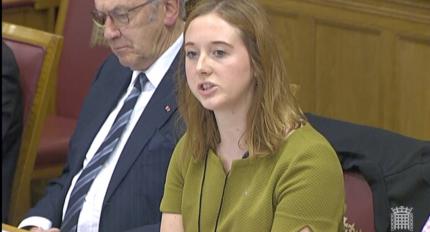Lords committee echoes NPA concerns over post-Brexit cheap food policy
25th Jul 2017 / By Alistair Driver
A House of Lords committee has warned that UK producers would be placed at a competitive disadvantage if Brexit resulted in a flood of lower standard imports.
 The House of Lords EU Energy and Environment Sub-Committee report Brexit: farm animal welfare concluded that the Government’s wish for the UK to become a global leader in free trade was ‘not necessarily compatible with its desire to maintain high animal welfare standards’.
The House of Lords EU Energy and Environment Sub-Committee report Brexit: farm animal welfare concluded that the Government’s wish for the UK to become a global leader in free trade was ‘not necessarily compatible with its desire to maintain high animal welfare standards’.
Its conclusions were partly shaped by the NPA's senior policy advisor Georgina Crayford (pictured giving evidence) who told the inquiry the pig industry's ‘big concern' reagarding Brexit was 'the talk from some government members that we need to pursue a cheap food policy’.
Commenting on the committee's findings, its chair Lord Teverson, said: “The UK has some of the highest farm animal welfare standards in the world and UK producers are rightly proud of those. We see no reason why Brexit should diminish those, as long as the Government is aware of the challenges ahead and acts accordingly.
“We heard evidence of undeniable concern that opening up the UK market to free global trade poses a number of issues. As we said in our last report, Brexit: agriculture, the Government may find it hard to reconcile its free trade ambitions with its commendable desire for preserving high farm animal welfare standards.
“We heard overwhelming support for farm animal welfare standards to be maintained or improved. To help achieve that, we urge the Government to secure the inclusion of high farm animal welfare standards in any free trade agreements it negotiates after Brexit.
“Whilst Brexit provides the UK with the unique opportunity to review and potentially improve farm animal welfare standards, the Government will need to consider the effect of increasing standards on the competitiveness of UK producers as well the future trading relationship with the EU”.
Consumer awareness
The Committee found that consumers are not always aware of the difference between production systems or willing to pay a higher price for premium welfare products, which it warned could ‘exacerbate the challenge to UK farmers’ competitiveness’ from an increase in cheaper, lower standard imports.
The report quotes Georgina as saying: “We need to be cautious about raising standards so high that we end up exporting production abroad. We need to make sure that we have a sensible policy so that farm businesses can be profitable and sustainable.”
The NPA ‘wants a level playing field, but we want to level up rather than down’, she added.
Taking this on board, the report stressed that while the repatriation of farm animal welfare policy presents opportunities to ‘review and improve farm animal welfare and standards’, the Government ‘will also need to consider the effect of increasing standards on the competitiveness of UK producers and the future trading relationship with the EU’.
It also found ‘an overwhelming reliance on non-UK EU citizens to fill crucial official veterinary positions in the UK, whilst the agricultural sector employs significant numbers of temporary and permanent farm workers’.
It called on the Government to ensure that the industry is able to retain or recruit qualified staff to fill these roles post-Brexit.
Timlely report
The Lords report was very timely. It reflected the widespread concerns about post-Brexit lower standard imports voiced by agriculture representatives and animal welfare charities who gave evidence to the inquiry.
Previously, Defra Ministers and even Prime Minister Theresa May have been at pains to insist the Government would not allow post-Brexit trading arrangement to compromise the UK’s high animal health and welfare standards.
But these guarantees are now looking flimsier with Trade Secretary Liam Fox, in Washington this week to discuss a future US-UK trade deal with US officials, reportedly in favour of removing the current EU barrier to imports of US chicken rinsed in chlorine.
The US is keen to include agriculture as part of any future trade deal but for that to happen, the UK is likely to have to lower its standards in a whole range areas, including potentially chlorine-rinsed chicken.
For the UK pig sector, differences in standards in the US include the use of feed additive ractopamine, the use of sow stalls, although these are being phased out by some companies, and different rules on antibiotic use.